Media Reform Inquiry: Live blog – Broadcasters to front inquiry on government’s media reform
Today saw the metropolitan and regional broadcasters along with Foxtel and others appear before the Senate Environment and Communications Committee, which was looking at the Government’s Media Reform Package.
Mumbrella’s Nic Christensen live-blogged the various appearances through out the day. Below you can find the testimony of among others: Seven West Media CEO Tim Worner, Prime Media’s Ian Audsley, SCA’s Grant Blackley, and Win’s Andrew Lancaster.
This live blog is now closed, however it covers some the broad eight hours of today’s testimony.
We’ll close off the blog here. But thank you to everyone who go involved in today’s live blog and stay tuned to the website where we’ll have reports on the next moves in media reform and more live blogs when the inquiry resumes in the coming weeks.
4.42pm – Senator McKenzie asking about to start asking about live streaming again. “If someone is licenced over here and they then come over and broadcast in some else’s space is that a breach of the licence conditions?”
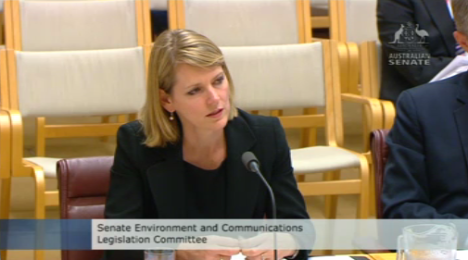 ACMA’s Jennifer McNeill responds: “This is more an equipment issue and there is some limited overspill that can occur for technical reasons”
ACMA’s Jennifer McNeill responds: “This is more an equipment issue and there is some limited overspill that can occur for technical reasons”
McKenzie: “but you can’t set up a broadcast tower in someone else’s space and just start broadcasting My Kitchen Rules?” No is the ACMA response but then when she asks if the same rule applies to live streaming McNeil explains the licence rule doesn’t apply.
“The reason for that lies in the a ministerial determination made some time ago,” referring to the 2002 decision of former communications minister Richard Alston that “streaming is not broadcasting”. “Content delivered over the internet was not a broadcasting service for the purposes of licencing.”
The ACMA notes that no licencee has complained to them about live streaming.
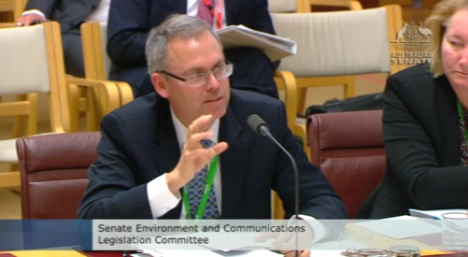 4.30pm – Senator McKenzie begins here questioning and notes she has lots of questions from estimates.
4.30pm – Senator McKenzie begins here questioning and notes she has lots of questions from estimates.
Asks about the points system and how they define local content. Assistant Secretary Rohan Buettel notes it was a originally drafted around “local content filmed in the area”.
However the Department had to revise this when they realised it was a “technological process and so we came up with the idea of people, places or things in the local area. So that no matter how it was record it can be taken into account. ”
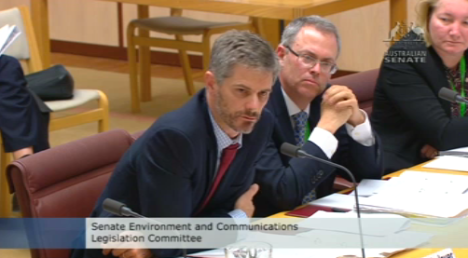 4.15pm – Senators are quizzing on the consultation process in regional areas. Jennifer McNeill general manager of the ACMA’s content, consumer and citizen division notes they actively reach out to “various stakeholders”.
4.15pm – Senators are quizzing on the consultation process in regional areas. Jennifer McNeill general manager of the ACMA’s content, consumer and citizen division notes they actively reach out to “various stakeholders”.
Asked about the Department’s view of the financial circumstances of the various regional TV players Windeyer notes: “It is true that they find themselves in a particularly difficult financial circumstance.”
Senator Reynolds asks what the potential outcome for media diversity might be and he responds: the thing to keep in mind is that the government isn’t seeking to remove all the rules for example the five/four rule remains and so there is a diversity floor so to speak. That isn’t being touched.
“On the issue of local content the comment I would make is that these reforms are being looked at through the prism of enhancing the regulatory minimum content requirement in the event of a ‘trigger event’.”
4.07pm – Senators are now questioning the Department if it has done any analysis of the state of Australian media diversity and anti-siphoning.
Labor’s Urquhart quizzes Windeyer over whether it has done any work on sporting events that might be removed from the list. “I don’t think we’ve done any work on that,” he responds, says he will double check with the department.
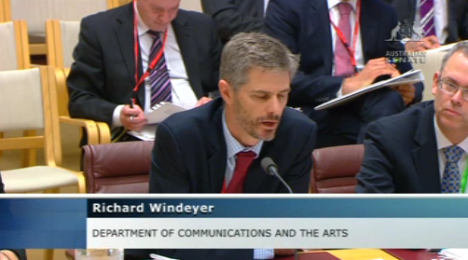 3.55pm – After a couple of rounds back and forward, where the Department acknowledges that it consulted the regional TV networks, Senator Urquhart gets to her point which is: “does the department have any sense on how ordinary Australian feel about this bill? I mean people out on the street.”
3.55pm – After a couple of rounds back and forward, where the Department acknowledges that it consulted the regional TV networks, Senator Urquhart gets to her point which is: “does the department have any sense on how ordinary Australian feel about this bill? I mean people out on the street.”
Department acting direct assistant secretary Richard Windeyer concedes they “haven’t gone out and held public consultations on this bill. We probably have, through previous work done in this area, have a sense of attitudes to issues around diversity.”
Senator Urquhart moves on to whether the Department has done any work on what the possible mergers might be if the bill goes through. Department says it has not done this work. She is now grilling the ACMA over its regulatory power and willingness to follow up complaints.
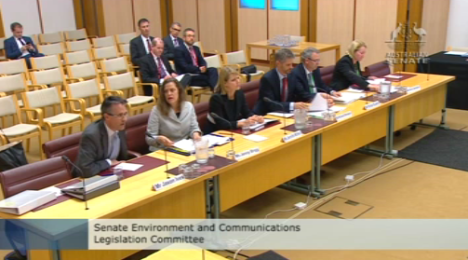 3.50pm – Ok we are back with the final instalment for today with the Department of Communications and the ACMA.
3.50pm – Ok we are back with the final instalment for today with the Department of Communications and the ACMA.
No opening statements and we are straight to questions with Anne Urquhart asking when they started work on the legislation and in particular this specific bill.
Department says it began in last quarter of last year but can’t give a specific date.
3.35pm – Proceedings suspended for a short afternoon break we should be back around 3.45pm for the final testimony of the day the Department of Communications and the media watchdog the Australian Communications and Media Authority (ACMA)
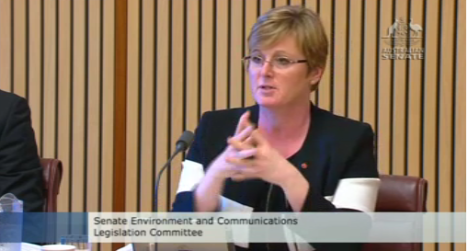 3.25pm – Senator Linda Reynolds challenges Murphy over the case of the regional broadcasters who today were pleading poor and Seven who argued that there was no immediate case for reform.
3.25pm – Senator Linda Reynolds challenges Murphy over the case of the regional broadcasters who today were pleading poor and Seven who argued that there was no immediate case for reform.
Reynolds notes that there appears to be a call for the Senate to wait until “there is some sort of magical agreement” within the media industry.
Murphy responds that they are supportive of the abolition of the reach rule and the new local content rules but not 2/3: “we think it will reduce diversity”.
“We can see the fault in the 2/3 rule, absolutely,” he says. “We are not here saying it is a rule that should be held for all time but we are saying it is something that should be dealt with in a broader context and to promote diversity.”
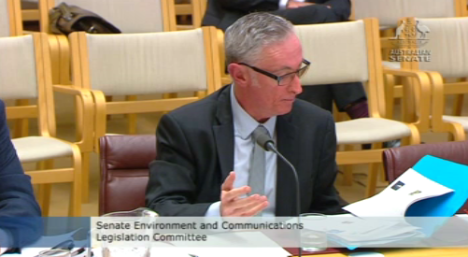 3.16pm – Senator James Paterson asking about media diversity and noting that according to Nielsen half the top sites are new entrants.
3.16pm – Senator James Paterson asking about media diversity and noting that according to Nielsen half the top sites are new entrants.
“We have a concern that there seems to some confusion in the content that has come from the government around what is platform and what is content,” says Murphy.
“People can access news from a wide range of platforms. It is an exciting time to deliver it from a range of places but when you look at the Nielsen ratings it is really the traditional providers that are the source. It may be delivered through a range of platform but the traditional providers continue to dominate.”
Chesher then adds: “Many of those new entrants aren’t concerned with Australian content. My household subscribers to the New York Times as well as News.com.au and Fairfax but you’d be hard pressed to find content on the New York Times about matters of domestic importance.”
3.10pm – MEAA CEO Paul Murphy summarises their concerns about the media reform package: “To the extent there is consolidation following the abolition (of the media laws) in our experience consolidation inevitably leads to a contraction in editorial staff. Which we don’t believe is in the public interest.”
“Our other concern is that this package and the package before it ignored the depth of coverage in the Convergence Review… and don’t take measures to promote more diversity.”
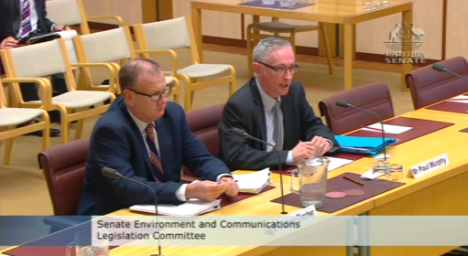 3.03pm – Up now is the Media Entertainment and Arts Alliance (MEAA) with Paul Murphy CEO and Matthew Chesher director of legal and policy testifying. The support the abolition of the reach rule but not 2/3 rule noting they believe these rules “are aimed at consolidation rather than the long spoken about level playing field.”
3.03pm – Up now is the Media Entertainment and Arts Alliance (MEAA) with Paul Murphy CEO and Matthew Chesher director of legal and policy testifying. The support the abolition of the reach rule but not 2/3 rule noting they believe these rules “are aimed at consolidation rather than the long spoken about level playing field.”
Murphy: “From our organisation’s point of view the clear starting point has to be the clear public interest in having a diverse media with reliable sources for news and entertainment.”
2.55pm – NSW Farmers are wrapping up with the journalist’s union the MEAA up next. Lovell is noting: “I believe there are commercial pressures which will erode content… which why our members would like to see those provisions of the bill strengthen to provide some ongoing regulation of what is local.”
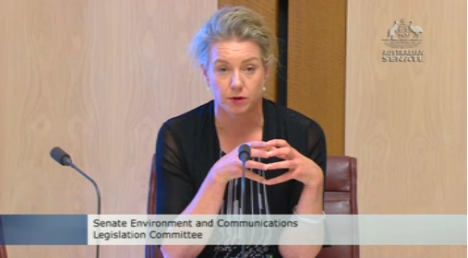 2.42pm – Senator Bridget McKenzie now chastising the regional broadcaster noting: “right now you can get away, as Southern Cross Austereo does, with 10 second rip and read press releases broadcast from the area because under the current laws it is deemed ‘of local significance’.
2.42pm – Senator Bridget McKenzie now chastising the regional broadcaster noting: “right now you can get away, as Southern Cross Austereo does, with 10 second rip and read press releases broadcast from the area because under the current laws it is deemed ‘of local significance’.
McKenzie notes that under the new points system there will be more points if the content is broadcast from the area and the NSW Farmers agree.
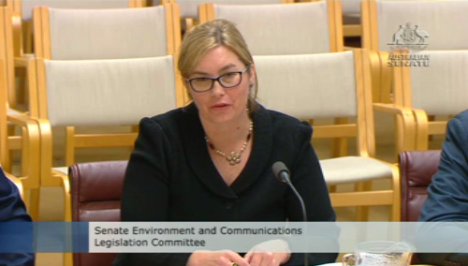 2.32pm – NSW Farmers policy director Jamie Lovell is discussing their mains concerns about the strengthen local content provisions and in particular enforcement and regulation.
2.32pm – NSW Farmers policy director Jamie Lovell is discussing their mains concerns about the strengthen local content provisions and in particular enforcement and regulation.
“Will there be fines for example? Lovell asks. “Can you fine someone for not having sufficient local content and then that money goes into a pool that goes into public broadcasting. Who we suspect would end up picking up much of the slack.”
Lovell asked if she supports the abolition of the two out of three rule she says they do not:”Our interest is not to be parochial our interest is to defend the rights of our members. For them it is not yet time.
“The regional companies are unlikely to provide local content just because it is a good thing they will some sort of incentive to do that or the government will have to look at providing some sort of funding through public broadcasters where thin markets don’t deliver.”
2.30pm – Derek Shoen President of the NSW Farmers Associations opens his remarks telling Senators: “We want to be sure we get an increase it service not a decrease in service… it is vitally important that the content is applicable to the audience that is going to receive it.”
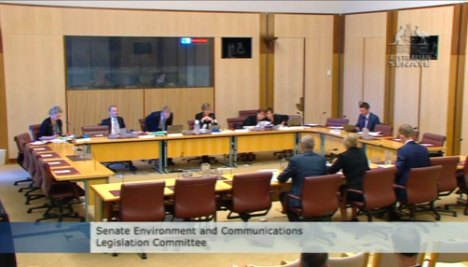 2.25pm – That’s the ACCC over and done with and now we are on to representative from the NSW Farmer’s Association.
2.25pm – That’s the ACCC over and done with and now we are on to representative from the NSW Farmer’s Association.
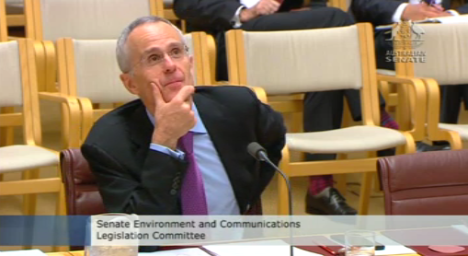 2.20pm – Scott Ludlam now tells Sims much of the testimony today has said mergers will happen if the laws pass and consolidation is likely to see less media diversity. Does Sims agree?
2.20pm – Scott Ludlam now tells Sims much of the testimony today has said mergers will happen if the laws pass and consolidation is likely to see less media diversity. Does Sims agree?
Sims: “It clearly will lead to some mergers and acquisitions and therefore some consolidation but with all the overseas players coming in and the wide range by which people can get content removing artificial constraints on the players could allow them to be stronger players – they could even leverage their journalism better.
“There is not a one to one relationship between consolidation and (media) diversity.”
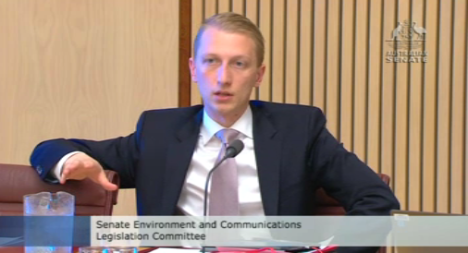 2.10pm – Senator James Paterson asks about the risk of competitive audience pressures on commercial players from the ABC. Paterson notes the ABC is in breach of the reach rule (which doesn’t apply to them).
2.10pm – Senator James Paterson asks about the risk of competitive audience pressures on commercial players from the ABC. Paterson notes the ABC is in breach of the reach rule (which doesn’t apply to them).
Sims: “it is an example of something more generally, I wouldn’t just base it on the ABC. I think you have got is an example of how players can come in and make the players look obsolete – the reach rule is clearly (obsolete) people are operating outside it. People who read newspapers are now reading online. It is an illustration the world is changing.”
Senator Patterson tries another tact: “is it appropriate that a government entity is exempt (from the reach rule) why shouldn’t the same rules apply to them?”
Sims: “competitive neutrality says if you are going to have rules they apply to everyone whether you are government owned or not. The bigger point I would make though it probably why the rules need a rethink rather than apply the rules to the ABC.”
Senator Nick Xenophon also questioned the ACCC about the five voices test might limit the merger options in the South Australian market. ACCC takes it to notice.
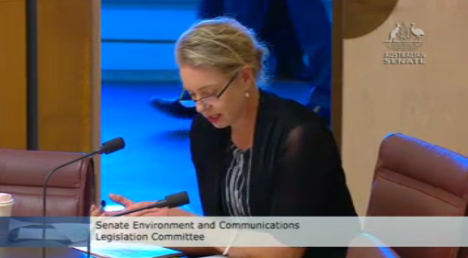 2.00pm – Senator Bridget McKenzie is now asking if the move by the metro TV networks to live streaming might be anti competitive behaviour.
2.00pm – Senator Bridget McKenzie is now asking if the move by the metro TV networks to live streaming might be anti competitive behaviour.
“It’s a loss leading move, no one is being charged for it. Would you have a very on that?,” she asks before adding “the view on your face is quite priceless”
Rod Sims responds: “I’m usually ready for most questions but hadn’t figured that one. The honest answer is we have seen the streaming occurring but that hasn’t been an issue that occurred to us.”
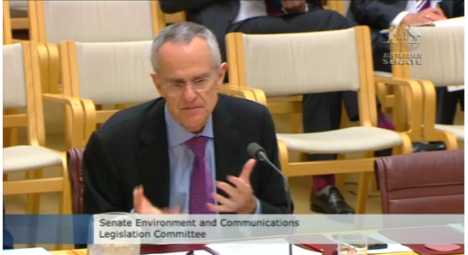 1.56pm – Rod Sims is being asked about what might happen were the media reform laws to be passed by Senator Anne Urquhart and also about the role of consumer behaviour.
1.56pm – Rod Sims is being asked about what might happen were the media reform laws to be passed by Senator Anne Urquhart and also about the role of consumer behaviour.
He notes it is difficult to speculate on what deals will be done but adds. “When we look at media we are going to have to look at market definition,” he says. “There are some people who get their news exclusively from TV and not newspapers others who get it from radio. You do have to take into account where people are getting their news.”
“It is not irrelevant that there are other avenues out there but it is important to know where they are getting it from.”
1.47pm – Greiss asked about how they view competition: “Competition is a very broad concept and we see it play out not just in the form of price but also see it in the realm of product differentiation.”
Sims notes that news and current affairs is important to TV competition: “we are less concern about movies and other forms of entertainment because they are so many more form of it.”
The ACCC says it has “added expertise” in the media area based on the Foxtel-Ten deal and also on Telstra/NBN etc.
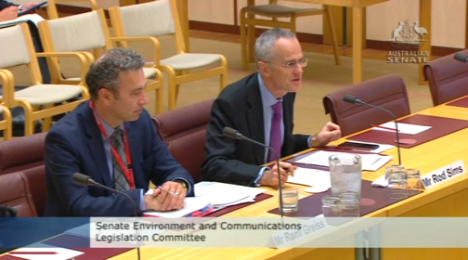 1.40pm – Welcome back. We are back up and running with the Australian Competition and Consumer Commission (ACCC) about to appear to discuss competition concerns.
1.40pm – Welcome back. We are back up and running with the Australian Competition and Consumer Commission (ACCC) about to appear to discuss competition concerns.
Up now are Rod Sims chairman of the ACCC and Rami Greiss executive general manager of mergers and acquisitions and it is worth noting that during the break Fairfax broke a story that Communications Minister Mitch Fifield has asked the ACCC to rethink its approach to media mergers as the government intends to abolish Keating-era ownership restrictions.
Dominic White is reporting he has see a letter the minister wrote “In light of these reforms and the significant and ongoing changes taking place in the media environment, I request that the ACCC consider updating its public guidance on its approach to media mergers.” It will be interesting to see if it comes up in testimony.
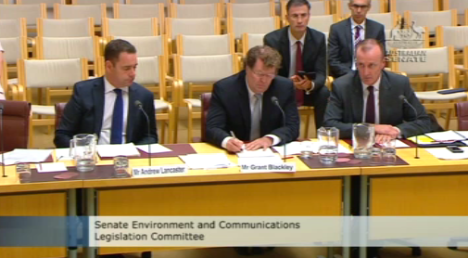 12.50pm – We’re wrapping up with Lanscaster again on what they want from the Senate: “I believe the 2/3 and reach rule is a good start because they are ridiculously outdated. 5/4 rule have benefit for protecting media diversity.
12.50pm – We’re wrapping up with Lanscaster again on what they want from the Senate: “I believe the 2/3 and reach rule is a good start because they are ridiculously outdated. 5/4 rule have benefit for protecting media diversity.
Ludlam notes the WIN submission describes a “freight train” bearing down on the regional TV networks.
Audsley: “It is fair to say that the position that we have put forward that we have bit hit.
“The decline hit us in September-October of last year. It hit us quickly and is sustained,” he says, noting SMI had regional falls of some 12% in January in regional TV markets “and it’s not coming back.”
“Given the recent circumstance we share the views of News and Seven that there needs to be broader reform – some people say this is piecemeal – one licence per market and the voices needs to be reviewed.”
We are now on a break until 1.30pm when the ACCC will testify before the committee.
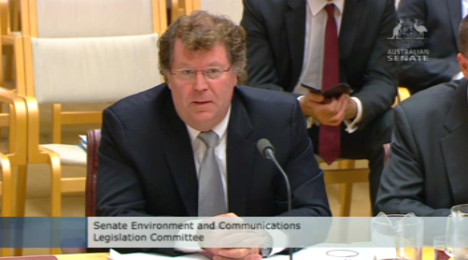 12.39pm – Southern Cross Austereo CEO is speaking about his various agreements with Seven, Nine and Ten in different markets.
12.39pm – Southern Cross Austereo CEO is speaking about his various agreements with Seven, Nine and Ten in different markets.
“We are really slave broadcasters to those affiliate arrangements,” says Blackley. “It is very hard to obtain our own content from third parties.”
Mckenzie asks if they support Nine’s suggestion that the ABC should ramp up its regional coverage. Unsurprisingly all three regional broadcaster don’t.
12.30pm – Lancaster notes that Seven claimed they had closed its Canberra bureau says this is not true and that they have ramped up the presence in places like Bendigo.
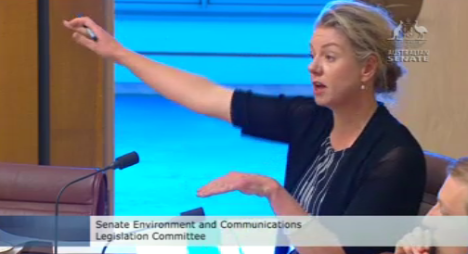 Senator Mckenzie now getting very animated on questions about affiliation fees and live streaming: “you are coming to government saying that you can’t afford to operated because they (the metro TV networks) are charging you so much then they are coming to the street, shaking off the carpet and setting up shop (through live streaming).
Senator Mckenzie now getting very animated on questions about affiliation fees and live streaming: “you are coming to government saying that you can’t afford to operated because they (the metro TV networks) are charging you so much then they are coming to the street, shaking off the carpet and setting up shop (through live streaming).
Audsley: “we have many issues with it.”
Mckenzie: “but none you will raise with them?”
Audsley: we will we just haven’t formulated our full response and we are keen to understand what happens in the Nine vs Win case… we are now clearly losing money to Seven. We lost it through the tennis – the client and the media buyer told us they were taking the money from us and told us they were putting on Seven’s streaming service.”
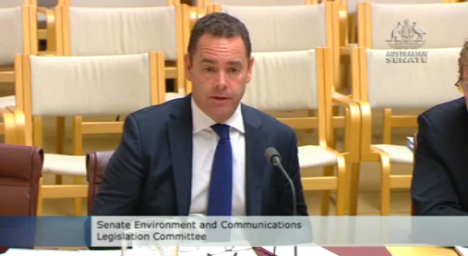
Win’s Lancaster
12.24pm – Win’s Andrew Lancaster: “the vast majority of the product we broadcast is the product sent down the lines by Seven, Nine and Ten.”
Senators ask about Seven’s testimony noted that the first to do a deal on merger is likely to be main beneficiary. Southern Cross Austereo’s Blackley agrees with that proposition.
They are now asking about whether there will be more cuts in regional newsrooms.
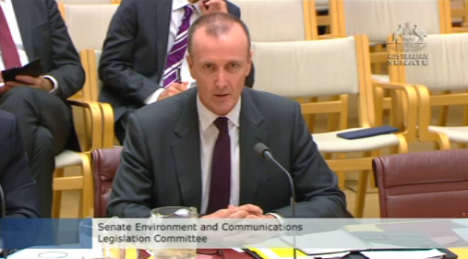 12.15pm – The Senators note that they are main beneficiaries of the law and ask what the impact of the changes will be.
12.15pm – The Senators note that they are main beneficiaries of the law and ask what the impact of the changes will be.
“It is fair to say that in a drought it is the edges of the lake that dry up first,” says Prime’s Audsley. In the television lake regional broadcasters are at the extremities of the lake.
“That drought has hit us already. Three years ago when I sat here my company was worth $366m today it has a market value of a $130m. The structural change has hit us substantially.
“If we are working in the same regulatory environment it is very hard to see how we can grow our business.”
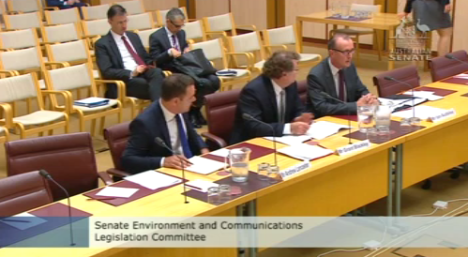 12.10pm – This is the big one. The CEOs of the three regional TV networks Prime CEO Ian Audsley, SCA’s Grant Blackley and Win’s Andrew Lancaster are now up.
12.10pm – This is the big one. The CEOs of the three regional TV networks Prime CEO Ian Audsley, SCA’s Grant Blackley and Win’s Andrew Lancaster are now up.
They are the ones who have been really pushing for the regional reforms. Ian Audsley opens noting how the metropolitan networks are undermining their business model with live streaming but also note they have concerns about how the trigger event provisions are drafted.
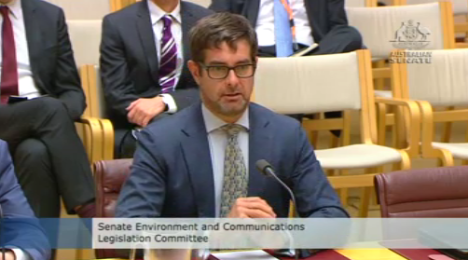 12.04pm – Maiden notes they have an “indirect interest” in the bill even though the anti-siphoning list is not part of the package.
12.04pm – Maiden notes they have an “indirect interest” in the bill even though the anti-siphoning list is not part of the package.
Foxtel’s Bruce Meagher notes that if the reform go through they will: “potentially improve the profitability of the free-to-air broadcasters. We compete with them for sports rights, they have a privileged position in the market for sports rights, and if they are more profitable then they are even further advantaged in the acquisition of sport.”
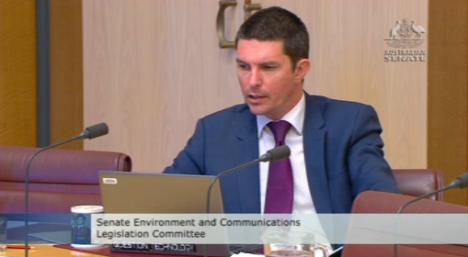 11.50am – Scott Ludlam asking Maiden about AFL matches and would they like to see them off the anti-siphoning list.
11.50am – Scott Ludlam asking Maiden about AFL matches and would they like to see them off the anti-siphoning list.
Maiden talks about their ‘principles approach’ saying “you should consider removing events that are not nationally significant. Events that involve small audiences, that don’t involve Australia or they are played overseas.
Senator: would Wimbeldon qualify? Maiden has to check and says it would depend on the match.
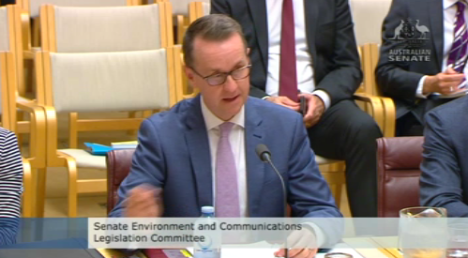
11.44am – Maiden says they would love the abolition of the anti-siphoning list but are happy with “modest trimming”.
Denies Seven’s allegation that they are trying to whittle down the anti-siphoning list noting the number of events on the list has gone up not down.
Maiden and Meagher now explaining to Senators the intricacies of the Foxtel business model and how they target many niche audiences and how important sport is to that business model.
“Senator our position is that the owners of these sporting codes should have the right to trade their asset as they see fit,” says Maiden. “with the revenue they might get from selling to free-to-air on one hand and some rights to pay on the other.
11.29am – Maiden now taking questions. He notes on the reform agenda: “Wherever you approach reform one issue at a time as soon as one interest group has attained their benefit there is no incentive to continue with the reform process that might be good for the economy but not good for it in the competitive sector.
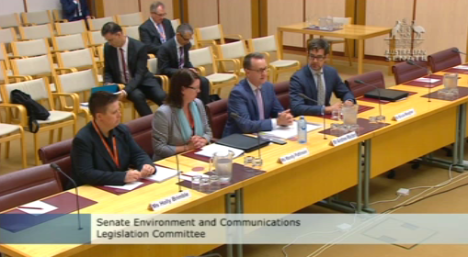 11.20am – Ok we are back and it’s now Foxtel and pay-TV lobby group ASTRA before the committee. ASTRA CEO Andrew Maiden opens the testimony.
11.20am – Ok we are back and it’s now Foxtel and pay-TV lobby group ASTRA before the committee. ASTRA CEO Andrew Maiden opens the testimony.
Andrew Maiden notes that their members know that media laws are “redundant” but they are concerned these laws only benefit certain players.
While we are not in principle opposed to reform we don’t support piece meal approaches,” says Maiden. “We don’t support what is a leg up to certain companies on a selective basis. In particular we don’t support changes to the reach rule in isolation from broader reform.”
Expect Maiden and also Foxtel’s Bruce Meagher to push the committee to look at the anti-siphoning list and concerns about tax concerns around the likes of Netflix.
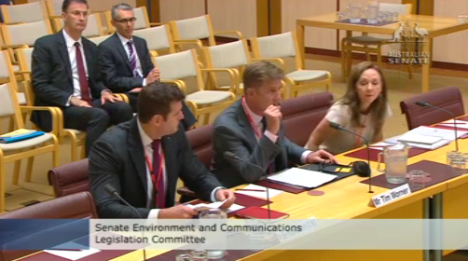 11.07am – This is very interesting. Liberal Senator James Paterson asks if they would look at merging with a regional player if the laws were changed. This is something Seven has previously ruled out or expressed minimal interest in, with Prime being the obvious partner if Seven West did buy someone.
11.07am – This is very interesting. Liberal Senator James Paterson asks if they would look at merging with a regional player if the laws were changed. This is something Seven has previously ruled out or expressed minimal interest in, with Prime being the obvious partner if Seven West did buy someone.
Worner departs from his previous rhetoric and tells Paterson if the laws pass M&A activity is: “always a possibility”.
Paterson asks if there has been any planning: “it would be irresponsible of us not to. We could be (in a position to buy a regional player).”
And with that proceedings are temporarily suspended before ASTRA and Foxtel come up.
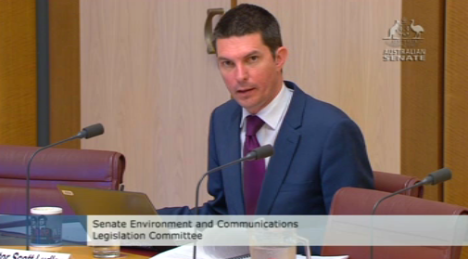 11.00am – Things are getting interesting. Greens Senator Scott Ludlam now up asking Worner to summarise what he would like to see.
11.00am – Things are getting interesting. Greens Senator Scott Ludlam now up asking Worner to summarise what he would like to see.
Worner: “I think what we are saying is we would like to see a more considered debate of a broader package of reforms. And right on the top of that package needs to be the abolition or reduction of licence fees.”
Ludlam fires back: What does the public get in return for a “steep loss of revenue”? Worner: “You are going to get a great deal more local content…” Ludlam cuts him off and suggests the money will go to the bottom line and shareholders rather than content.
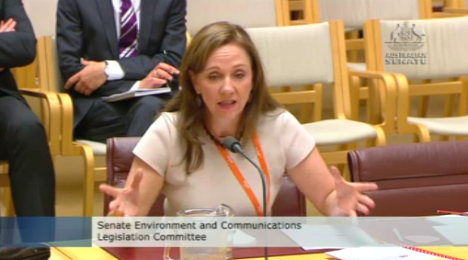 10.51am – Bridget Fair, Seven’s chief lobbyist, is pushing the idea that this is “piecemeal reform”. Fair: “we are looking for a comprehensive reform”.
10.51am – Bridget Fair, Seven’s chief lobbyist, is pushing the idea that this is “piecemeal reform”. Fair: “we are looking for a comprehensive reform”.
Reynolds counters that two of the big rules have been proposed in the reforms. Fair says: “there hasn’t been a proper public debate or parliamentary debate.”
Seven says this will likely result in “one deal”. They appear concerned that Nine will merge with a regional and become stronger. Ben Roberts-Smith now up talking about how it pays affiliation fees and has some 180 employees and only three finance staff shared.
10.41am – Tim Worner is really hammering the risk of Foxtel taking big sports events away free-to-air TV.
“We have a very successful pay-TV company – which is bigger than all the free-to-air networks combined, taking a share-holding in a free-to-air broadcaster,” says Worner. “It stands to reason that they could join forces.”
He focuses on the V8 Supercars: “There are now 70% of Australian who do not see V8 super cars because of a deal between Ten and Foxtel.”
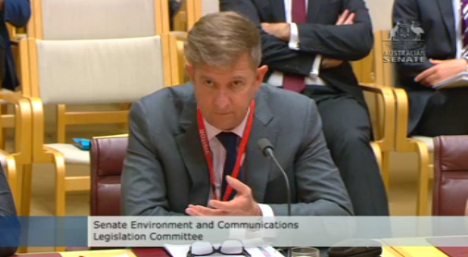
10.32am – Tim Worner now taking questions. Senators are asking about competitive landscape.
Worner responds: “There are more competitors than ever before, there are more powerful competitors than ever before and they are playing under a different set of rules to the ones we are.”
Seven boss argues local content should be important asked if diversity should be a consideration: “Yes, I think diversity and localism can be different and are different. But I think our point is that we don’t feel there has been enough debate about issues like diversity. I don’t call this reform I don’t think these are reforms.”
Also takes aim at the risk of changes to the anti-siphoning list which governs which sports are on free-to-air TV: “What we are fearful of a piecemeal approach… what we would be extremely fearful is something that is done now results in a change to the anti-siphoning list down the track.”
“That’s something we should all be wary of and certainly something the 70% of Australians who rely on free-to-air TV for their sport will be concerned about.”
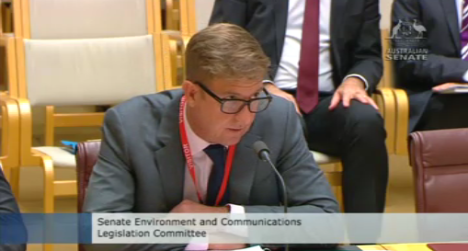 10.20am – Okay, Seven West Media’s executive team is up now. Tim Worner is delivering his opening statement, noting how its regional network is “an excellent case study in how to run a regional TV outlet” and adds, with a kick, “it is not being asked to get bought out so someone else can ‘save our voices.'”
10.20am – Okay, Seven West Media’s executive team is up now. Tim Worner is delivering his opening statement, noting how its regional network is “an excellent case study in how to run a regional TV outlet” and adds, with a kick, “it is not being asked to get bought out so someone else can ‘save our voices.'”
That’s a crack at regional broadcasters Win, Prime and Southern Cross Austreo, all of which have run a public “Save Our Voices” campaign for media reform. Worner was a “comprehensive package” to media reform focus on cutting licence fees.
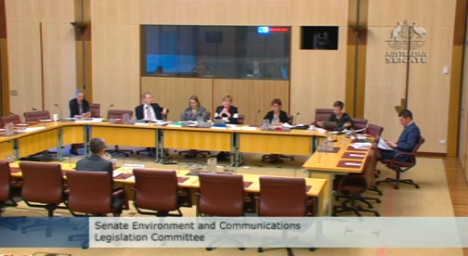 10.16am – Committee chair Reynolds now wrapping up Wilding’s testimony: asks if there has been a degree of conflation of media diversity and ownership. Reynolds: ‘is it right that it’s not necessarily true that just because you change media ownership laws you will get more diversity – we have to look at both of them not just one or the other?”
10.16am – Committee chair Reynolds now wrapping up Wilding’s testimony: asks if there has been a degree of conflation of media diversity and ownership. Reynolds: ‘is it right that it’s not necessarily true that just because you change media ownership laws you will get more diversity – we have to look at both of them not just one or the other?”
Wilding agrees but notes these issues are complex and that there is a role for the regulator the ACMA in all this.
10.13am – Stay tuned folks – the senior Seven West Media executives, including CEO Tim Worner, will be up shortly. Right now the Senate inquiry is hearing about the risk of a reduction in local content under the new points system.
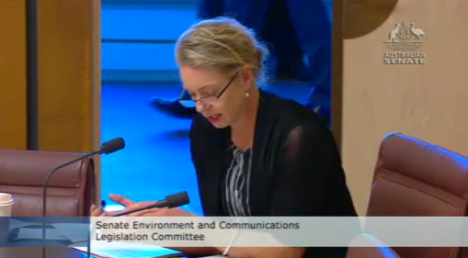 10.05am – Nationals’ MP Bridget McKenzie is asking about Nine Entertainment’s submission that they are worried about the new local content rules and that the ABC should be included in media reform and charged with doing more news in regional areas. Read Hugh Marks’ comment in Fairfax today here.
10.05am – Nationals’ MP Bridget McKenzie is asking about Nine Entertainment’s submission that they are worried about the new local content rules and that the ABC should be included in media reform and charged with doing more news in regional areas. Read Hugh Marks’ comment in Fairfax today here.
“I don’t agree with that. There is a problem with the viability of news and current affairs but there isn’t a problem with news and current affairs in metropolitan areas,” says Wilding, noting it is profitable content. “In the absence of a dire situation where everything collapses I don’t think we should be thinking of a situation where the ABC is the only provider of news.”
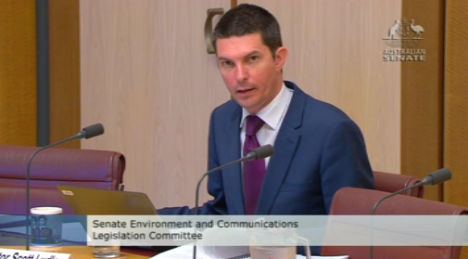 10.02am – Greens communications spokesman Scott Ludlam asks about media diversity, but Wilding says: “There at least is the possibility that this bill encourages local competitors to those global international sources.”
10.02am – Greens communications spokesman Scott Ludlam asks about media diversity, but Wilding says: “There at least is the possibility that this bill encourages local competitors to those global international sources.”
9.58am – Senator Nick Xenophon is up again on the phone. Asks: under the proposed bill it makes reference to local programming requirements in his home State of South Australia: “would that mean local broadcasters would reinstate the old half-hour local TV news bulletin?
Wilding notes his focus has been on 2/3 rule but adds: “on my reading of it (the act does not require the reinstatement of a half-hour news bulletin. However, it does appear to move significantly from the current position.”
You can find the new local content maps that would be enacted in the event of media mergers below. As you can see the local content rules are extended into South Australia and Western Australia.
9.50am – Wilding, who previously worked for the Australian Press Council, is going through potential merger scenarios like News/APN or Fairfax/Nine. Check out some of the scenarios covered in the media here.
Anne Urquhart, a Labor Tasmanian senator, asks about media diversity in her home state of Tasmania: “I can’t tell you what means for the combination of TV and print journalists but potentially there is a cost saving – that is a commercial decision.”
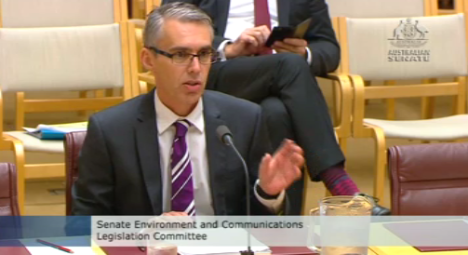 9.45am – Derek Wilding from UTS is telling the committee: “Ownership and control legislation is not about Australian drama, kids TV, anti-siphoning; it is really about news and current affairs.”
9.45am – Derek Wilding from UTS is telling the committee: “Ownership and control legislation is not about Australian drama, kids TV, anti-siphoning; it is really about news and current affairs.”
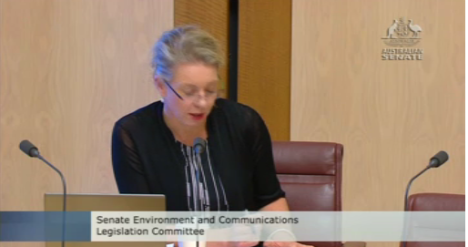 9.41am – Linda Reynolds is moving very quickly with questions. We breeze through Nationals senator Bridget McKenzie who is interested in the trigger rule and whether they can be toughened to protect regional news services.
9.41am – Linda Reynolds is moving very quickly with questions. We breeze through Nationals senator Bridget McKenzie who is interested in the trigger rule and whether they can be toughened to protect regional news services.
We are then back to Reynolds, who finishes Ricketson’s time by asking about the five-four rule – the restrictions on the number of independently-controlled media voices of five in a metro area or four in a regional area. Ricketson responds: “It will provide some protection but the laws will still potentially concentrate media ownership in this country. “
9.35am – Greens Senator Scott Ludlam now up notes he has “dozens” of questions (we won’t have time) but asked around how you define the public interest and Ricketson’s role in the Finkelstein report and whether media reform is needs to broader.
Ricketson directs him to his submission and some other sources on this.
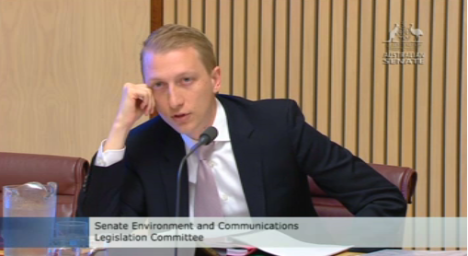 9.32am – New Liberal Senator James Paterson is now up questioning Ricketson about the emergence of the Guardian, Daily Mail, Huffpo on the Nielsen Online Ratings.
9.32am – New Liberal Senator James Paterson is now up questioning Ricketson about the emergence of the Guardian, Daily Mail, Huffpo on the Nielsen Online Ratings.
Paterson: “What that demonstrates is that the lowering of the barriers to entry has created more diversity in Australia.” Notes his tone on the legislation is “very negative”
Ricketson responds: “I am asking the committee to encourage more diversity and for quality journalism. ”
9.26am – Independent Senator Nick Xenophon dialling in now asking about the trigger provisions in the act: “Do you consider the triggers would be sufficient to bring back regional news services in South Australia and West Australia?
Ricketson takes question on notice.
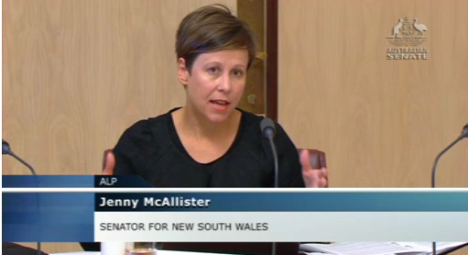 9.21am – Labor Senator Jenny McAlister is now quizzing Ricketson about the major institutional players in the Australian media landscape. Asks about concentration of media Ricketson responds that the Australian landscape is “very concentrated”.
9.21am – Labor Senator Jenny McAlister is now quizzing Ricketson about the major institutional players in the Australian media landscape. Asks about concentration of media Ricketson responds that the Australian landscape is “very concentrated”.
“When you look at the top news websites it is still the major (legacy) publishers,” said Ricketson. For those interest you can see the latest Nielsen numbers which are out today here.
9.15am – Ricketson gives a view of the media landscape and the dominance of News Corp and Fairfax in the newspaper sector and their importance to journalism.
He is being questioned by committee chair Senator Linda Reynolds about what he defines as “quality journalism”. He responds “not clickbait journalism”.
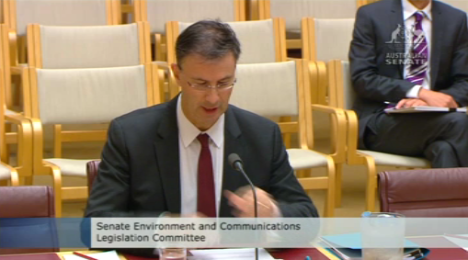 9.10am – Ok we are off and running with academic Matthew Ricketson telling the committee: “In my view the proposed amendments have the ability to detract from the media diversity”.
9.10am – Ok we are off and running with academic Matthew Ricketson telling the committee: “In my view the proposed amendments have the ability to detract from the media diversity”.
He says he supports the abolition of the reach rule but on the two out of the three rule he wants protections to ensure quality journalism.
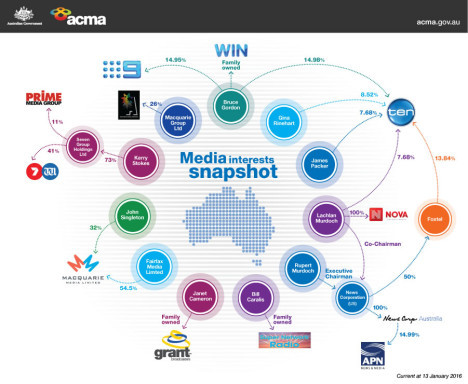 9.00am – Welcome to the Mumbrella live blog covering today’s Senate Environment and Communications Committee hearings on the Government’s media reform package. This page will be updated from 9.00am through the day.
9.00am – Welcome to the Mumbrella live blog covering today’s Senate Environment and Communications Committee hearings on the Government’s media reform package. This page will be updated from 9.00am through the day.
As a short introduction let’s just go through the agenda for today:
- 9.00am we have Professor Matthew Ricketson, University of Canberra.
- 9.35am Professor Derek Wilding from the University of Technology Sydney.
- 10.10am Seven West Media management will present including CEO Tim Worner, chief lobbyist Bridget Fair, and Ben Roberts-Smith, general manager, Seven Queensland
- 11.00am pay-TV lobby group ASTRA and Foxtel will present their case for broadening reform to anti-siphoning.
- 11.40am will be when the big fireworks of the day occur – with the three regional broadcasters presenting. Prime CEO Ian Audsley, SCA’s Grant Blackley and Win’s Andrew Lancaster will talk about the challenges facing the regional broadcasters.
- 1.30pm the Australian Competition and Consumer Commission (ACCC) will appear to discuss competition concerns.
- 2.10pm the NSW Farmer’s Association will present on their concerns about the impact of the reforms on rural media.
- 2.50pm we have the journalist’s union, the MEAA.
- And finally, at 3.40pm will be the Department of Communications and media watchdog the Australian Communications and Media Authority (ACMA), on the regulatory environment.
It promises to be a full day you can find the full submissions for all the parties (including those not testifying) here. And for those wanting a 101 on the politics and what we’re likely to see, we recommend you take a look at our layman’s guide to media reform, which talks about these issues.



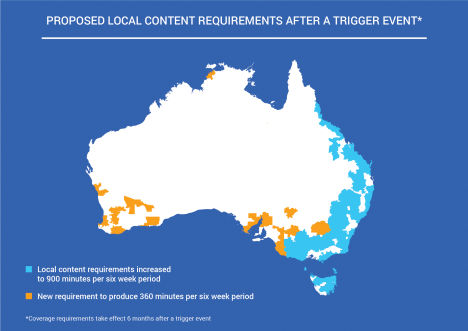

Interesting with a massive Fairfax / Huffpost break today, which should send ripples around the world that NewsCorp have not published a drop yet… Be great for Mumbrella to post about how this gains traction and how certain publishers choose not to get on board: why would that be?
User ID not verified.